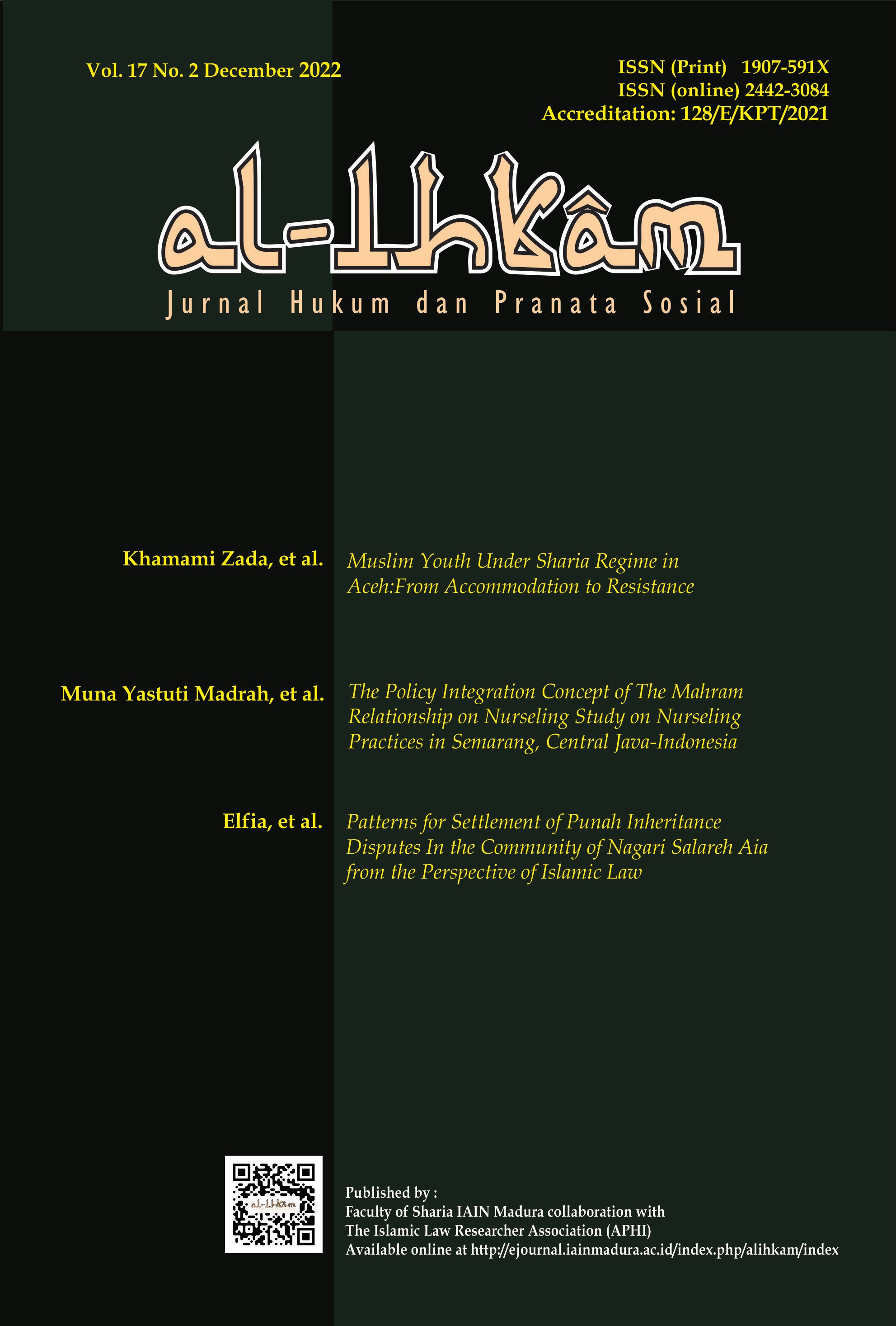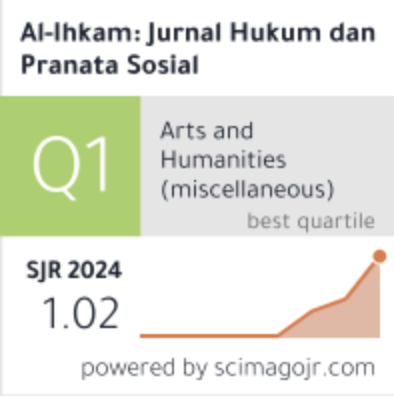State Authority for Management of Zakat, Infaq, and Sadaqah as Locally-Generated Revenue: A Case Study at Baitul Mal in Aceh
 Abstract views: 1598
,
Abstract views: 1598
,
 PDF downloads: 995
PDF downloads: 995
Abstract
Aceh is a region with an autonomy in implementing Islamic law (sharia) and Baitul Mal is one of the institutions formed by the local government to support it. This article aims to discuss the authority of the state in managing zakat, infaq, and sadaqah (ZIS), and describe the authority of the Baitul Mal in managing ZIS as locally-generated revenue (PAD) in Aceh. The study used a case study approach by using the theory of authority as an analytical tool. Data collection techniques were carried out through interviews and document studies. The informants interviewed were the staff of the Baitul Mal and the staff management of the Ulema Consultative Council (MPU) in Pidie Regency and Sabang City. It found that the state, in this case, Baitul Mal, has the authority to manage ZIS which can be treated as PAD. This practice has contributed to poverty alleviation, scholarships, business capital, and community economic empowerment in Aceh. To facilitate the management of zakat funds, lex specialis can be applied as a position of Islamic law in the national legal framework.
Downloads
References
Aceh, Baitul Mal. Laporan Akuntabilitas Kinerja Instansi Pemerintah/Laporan Kinerja 2020. Banda Aceh, 2020.
———. Laporan Keuangan Baitul Mal Aceh Tahun Anggaran 2021. Banda Aceh, 2021.
———. Laporan Tahunan Baitul Mal Aceh Tahun Anggaran 2017. Banda Aceh, 2017.
Aceh, Qanun. “Qanun Aceh No. 10 of 2007 Concerning Baitul Mal.” Banda Aceh, 2008.
Adnan, Muhammad Akhyar. “The Effectiveness of Baitul Maal Wat Tamwil in Reducing Proverty.” Humanomics 31, no. 2 (2015): 160–182.
Amalia, Euis. Keadilan Distributif Dalam Ekonom Islam. Jakarta: Grafindo Persada, 2009.
Azhari, Rizki. “Peran Pemerintah Dalam Pemberdayaan Ekonomi Masyarakat Melalui Baitul Mal Aceh.” Jurnal Al-Madaris 2, no. 1 (2021).
Djawas, Mursyid. “Implementasi Pengelolaan Zakat Di Aceh,” Mazahib: Jurnal Pemikiran Hukum Islam.” Mazahib: Jurnal Pemikiran Hukum Islam 14, no. 1 (2016): 90–103.
Ellimartati. “Strengthening Family Resilience Through the Tradition of Agricultural Zakat Payment in Nagari Lima Kaum in Tanah Datar District of West Sumatera.” Samarah: Jurnal Hukum Keluarga dan Hukum Islam 5, no. 1 (2021): 496–513.
Hariyanto, Erie. “Public Trust in the Religious Court to Handle Dispute of Sharia Economy.” AHKAM : Jurnal Ilmu Syariah 22, no. 1 (2022): 185–208.
Hariyanto, Erie, and Moh Ali Al-humaidy. “Pelaksanaan Corporate Social Responsibility Dan Zakat Perusahaan Perbankan Syariah Di Madura.” Jurnal Hukum & Pembangunan 49, no. 3 (2019): 688–709.
Hidayatulloh, M. Haris. “Peran Zakat Dan Pajak Dalam Menyelesaikan Masalah Perekonomian Indonesia.” Al Huquq: Journal of Indonesian Islamic Economic Law 1, no. 2 (October 2019): 102–121.
Hooker, M. B. “Southeast Asian Sharī’ahs.” Studia Islamika 20, no. 2 (2013): 183–242.
Idri. “Religius Court in Indonesia: History and Prospect.” Journal of Indonesia 3, no. 2 (2009): 279–313.
Iska, Syukri, David David, Elsy Renie, and Ifelda Nengsih. “Implications of the Pagang Gadai Contract on Disharmony Social Actors in Minangkabau Community.” JURIS (Jurnal Ilmiah Syariah) 21, no. 1 (June 2022): 27–37.
Kasdi, Abdurrohman. “Development of Waqaf in the Middle East and Its Role in Piooneering Contemporary Islamic Civilazation: A Historical Approach.” Journal of Islamic Thought and Civilzation (JITC) 12, no. 1 (2022): 187–198.
Mas’udi, Farid Masdar. Agama Dan Keadilan: Risalah Zakat (Pajak) Dalam Islam. Jakarta: P3M, 1993.
Muchsin, Misri Abdul. “Historical Development of Tax During the Early Islamic Period: Jizyah and Kharaj.” Journal of Tamaddun 14, no. 2 (2019): 187–198.
Musa, Armiadi. “Kontribusi Pemerintah Dalam Pengelolaan Zakat Di Aceh (Kontestasi Penerapan Asas Lex Specialis Dan Lex Generalis).” Media Syariah 16, no. 1 (2014): 349–350.
———. “Zakat as Locally-Generated Revenue: Its Accounting Treatment At Baitul Mal Aceh.” Share: Jurnal Ekonomi dan Keuangan Islam 9, no. 2 (2020): 184–205.
———. “Zakat Sebagai Pendapatan Asli Daerah Dalam Undang-Undang Pemerintahan Aceh.” Kanun: Jurnal Ilmu Hukum 18, no. 3 (2016): 403–415.
Nasrullah. “Regulasi Zakat Dan Penerapan Zakat Produktif Sebagai Penunjang Pemberdayaan Masyarakat (Studi Kasus Pada Baitul Mal Kabupaten Aceh Utara.” Inferensia: Jurnal Penelitian Sosial Keagamaan 9, no. 1 (2015).
Nawawi, Hadari. Metode Penelitian Bidang Sosial. 1st ed. Yogyakarta: Gajah Mada University Press, 2003.
Nurdin, Abidin. “The Implementation of Meunasah-Based Sharia in Aceh: A Social Capital and Islamic Law Perspective.” Samarah: Jurnal Hukum Keluarga dan Hukum Islam 5, no. 2 (2021).
Qanun Aceh. Qanun Aceh Number 10 of 2018 Concerning Baitul Mal Aceh. Banda Aceh, 2018.
Ridhwan. “The Petta Kalie’s Contribution in The Development of Islamic Law During the Kingdom of Bone.” Samarah: Jurnal Hukum Keluarga dan Hukum Islam 5, no. 1 (2021): 64–87.
Rofiq, Ahmad. Fiqh Kontekastual: Dari Normatif Ke Pemaknaan Sosial. Yogyakarta: Pustaka Pelajar, 2004.
Sa’adah, Mazro’atus, and Uswatun Hasanah. “The Common Goals of BAZNAS’ Zakat and Sustainable Development Goals (SDGs) According to Maqasid Al-Sharia Perspective.” Al-Ihkam: Jurnal Hukum dan Pranata Sosial (2021).
Salim. Penerapan Teori Hukum Pada Penelitian Tesis Dan Disertasi. Jakarta: Rajawali Press, 2017.
Sarkowi. “Akar Historis Formalisasi Hukum Islam Di Nusantara.” Jurnal Sejarah Citra Lekha 5, no. 1 (2020): 14–27.
Setiawan, Bagus. “Infaq Dalam Tafsir Al-Qur’an Surat Al-Baqarah Ayat 261.” Jurnal Islamic Banking 1, no. 1 (2015): 61.
Sulistiani, Siska Lis. “The Legal Position of Waqf for Non-Muslims in Efforts to Increase Waqf Assets in Indonesia.” Samarah 5, no. 1 (January 2021): 357–371.
Syafrudin, Ateng. “Menuju Penyelenggaraan Pemerintahan Negara Yang Bersih Dan Bertanggungjawab.” Jurnal Pro Justisia Edisi IV (2000).
Syahbandir, Mahdi. “State and Islamic Law: A Study of Legal Politics on Zakat as a Tax Deduction in Aceh.” Ahkam: Jurnal Ilmu Syariah 22, no. 1 (2022).
Syaikhu. “The Empowerment of Infaq and Waqaf Evaluation in Light of Maqashid Al-Sharia Perspektive in Mosques in Palangka Raya, Indonesia.” Samarah: Jurnal Hukum Keluarga dan Hukum 5, no. 2 (2021): 1003–1020.
Copyright (c) 2023 AL-IHKAM: Jurnal Hukum & Pranata Sosial

This work is licensed under a Creative Commons Attribution-ShareAlike 4.0 International License.
In order to be accepted and published by Al-Ihkam: Jurnal Hukum dan Pranata Sosial, author(s) submitting the article manuscript should complete all the review stages. By submitting the manuscript, the author(s) agreed to the following terms:
- The copyright of received articles shall be assigned to Al-Ihkam: Jurnal Hukum dan Pranata Sosial as the publisher of the journal. The intended copyright includes the right to publish articles in various forms (including reprints). Al-Ihkam: Jurnal Hukum dan Pranata Sosial maintain the publishing rights to the published articles.
- Authors are permitted to disseminate published articles by sharing the link/DOI of the article at Al-Ihkam: Jurnal Hukum dan Pranata Sosial. Authors are allowed to use their articles for any legal purposes deemed necessary without written permission from Al-Ihkam: Jurnal Hukum dan Pranata Sosial with an acknowledgment of initial publication to this journal.
- Users/public use of this website will be licensed to CC-BY-SA.



.png)
_1.png)


_page-00011.jpg)


